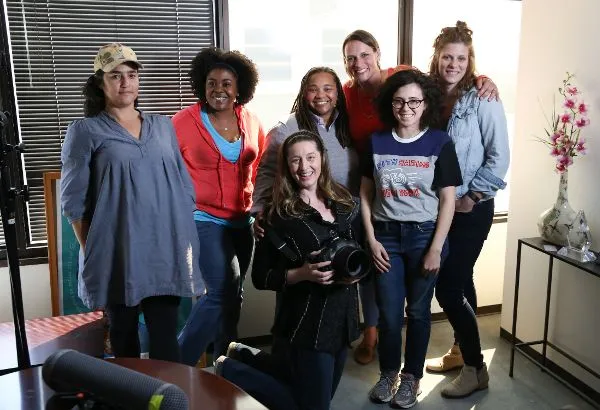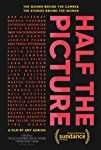Eye For Film >> Movies >> Half The Picture (2018) Film Review
Half The Picture
Reviewed by: Owen Van Spall

Amy Adrion’s broad-ranging documentary is certainly timely, as it explores the question on everyone's lips in the film industry in both Hollywood and the UK: Why are there so few female TV and film directors?
One thing the film isn’t is a reinvention the wheel in terms of documentary form; this is a study very much carried out in the standard way via a conveyor belt of talking heads (directors mostly, but also screenwriters, producers and some industry journalists and academics) discussing their own experiences and in some cases, the stats they have uncovered and the off-the-record stories they have recorded. Yet there is undoubted power in this straightforward approach, as it is important to learn how sexism in the industry has a personal impact on women; it is an individual attack as much as an abstract ‘wider, multi-level problem’ that might be seen as something abstract, like a failure in a petri dish. And as much as each woman interviewed here has their own unsettling and infuriating example of how sexist practices and mindsets affected them in particular, what is as disturbing is how their stories keep aligning too. And then you have to think about how it seems no documentary like this has ever been made, or certainly not recently. We still have a problem, Houston.

Adrion certainly couldn’t have assembled a better group of interviewees here. For one thing, we have Ava DuVernay (Selma), hot off landing a Disney gig (this year’s A Wrinkle In Time) who recounts wondering why a film as acclaimed as her 2012 Sundance Film Festival prize-winning feature film Middle Of Nowhere and her 2014 biopic of Martin Luther King didn’t right away open the same kind of doors that frequently get kicked open for young, white male directors who get a superhero movie after one hit indie.
One of the older contributors who scored a hit directing gig decades ago, Wayne’s World director Penelope Spheeris, is probably the MVP of this doc thanks to a well-honed biting sense of humour. She got a foot in the door by knowing how to work the equipment and then just picking up the camera to film the punk scene she was a part of for her seminal doc The Decline of Western Civilization (1981), which led to work on Saturday Night Live. Spheeris ultimately got the gig directing Wayne's World (1991) because Lorne Michaels felt guilty for stiffing her on some SNL gigs, according to her, but now she’s practically given up on filmmaking and devotes her energy to house-building projects. If that is an admission that there is less sexism amongst construction workers than in the film industry, then, wow. There are, sadly, plenty of more explicit examples of full-on boorishness to come, with Valley Girl (1983) director Martha Coolidge recounting how a meeting with execs resulted in the instruction that she include "at least four scenes with tits" to get the gig.
Coolidge made that compromise in order to get the gig, and many of the other interviewees discuss instances of biting the lip, grinding the teeth, and accepting you had to play the game to ‘sneak’ your way in. One thing that emerges over the course of listening to so many of these women filmmakers working in such an environment, is how it can have a psychological impact, how certain toxic attitudes can be internalised or contexts forgotten. For example, Transparent director Nisha Ganatra talks about how easy it is to fail to give another female a filmmaker a leg up, she naturally found herself ranking the men's work as better on showreels until she realised how the women cinematographers were usually working with far fewer resources. Journalists like Rachel Keegan have some depressing ‘off the record’ conversations to recount about how the problem is so multi-level that simply changing executives and CEO’s mindsets (or changing them out of a job, full stop) isn’t enough; what do you do, for example, if the stars keep demanding only certain directors helm their projects and all their shortlists are male?
Despite its conventional approach, Adrion’s doc reveals itself to be a comprehensive and important study that not only includes people of colour and LGBTQ filmmakers - who of course have their own issues in relation to exclusion - but directors who are at different stages in their career and from different age brackets. This helps illustrate the persistent nature of the problem of sexism, and one thing Adrion’s doc hits you with in the first few minutes, and leaves you shaken by, is the realisation that the waves caused by #MeToo and #TimesUp are obscuring the chilling fact that exclusion of women from the top jobs in Hollywood is a failing that has NOT substantially been corrected over time. Clearly it is going to take more time for time to be really ‘up’.
Reviewed on: 01 Jun 2018
















